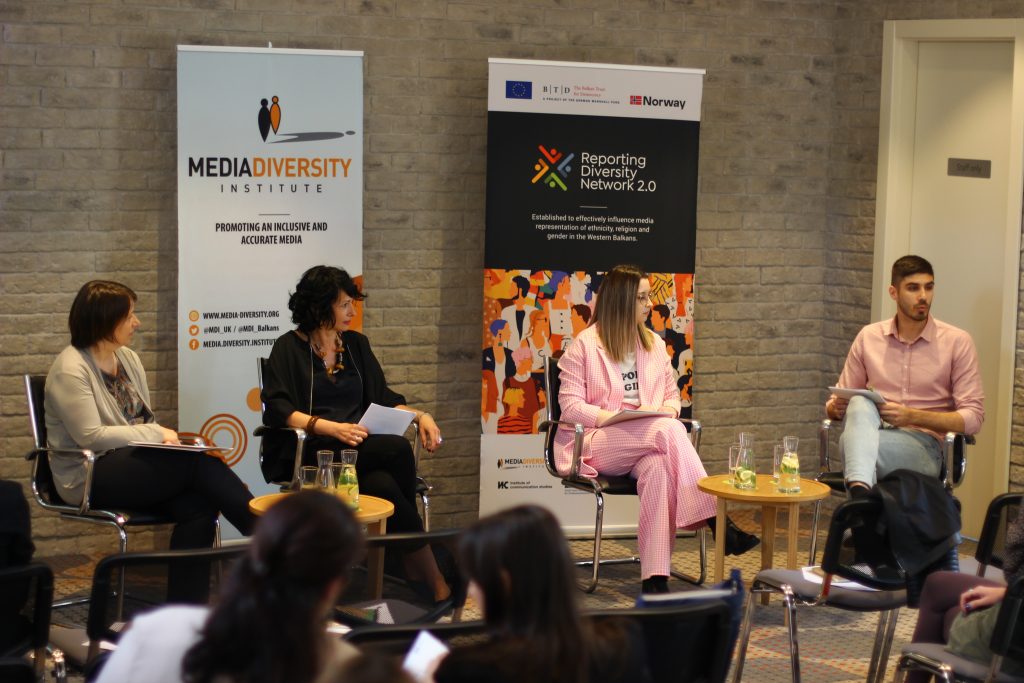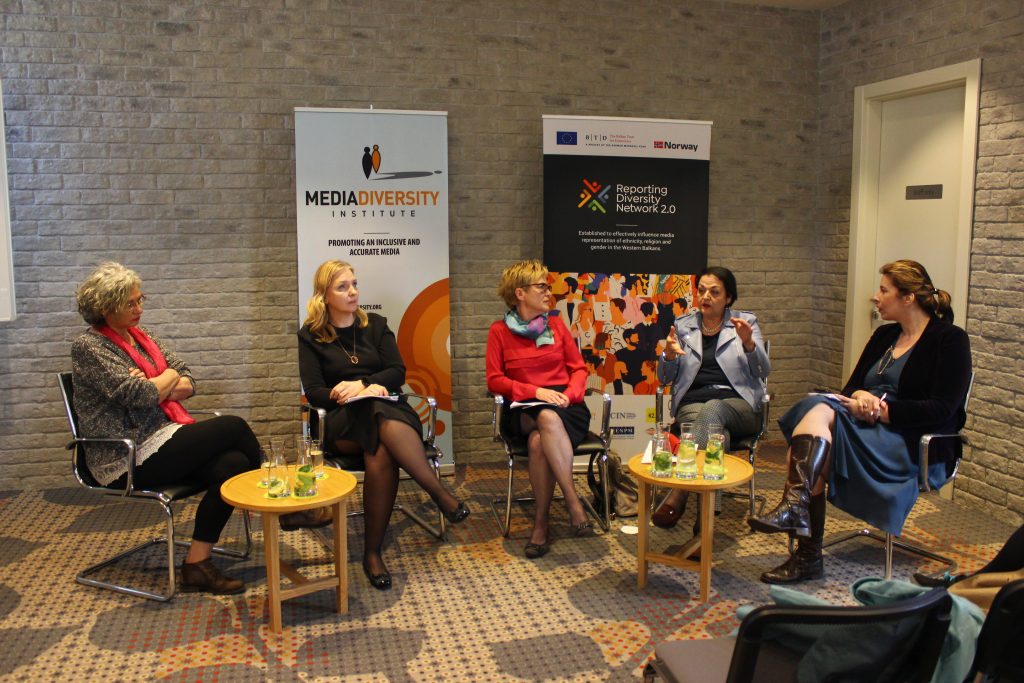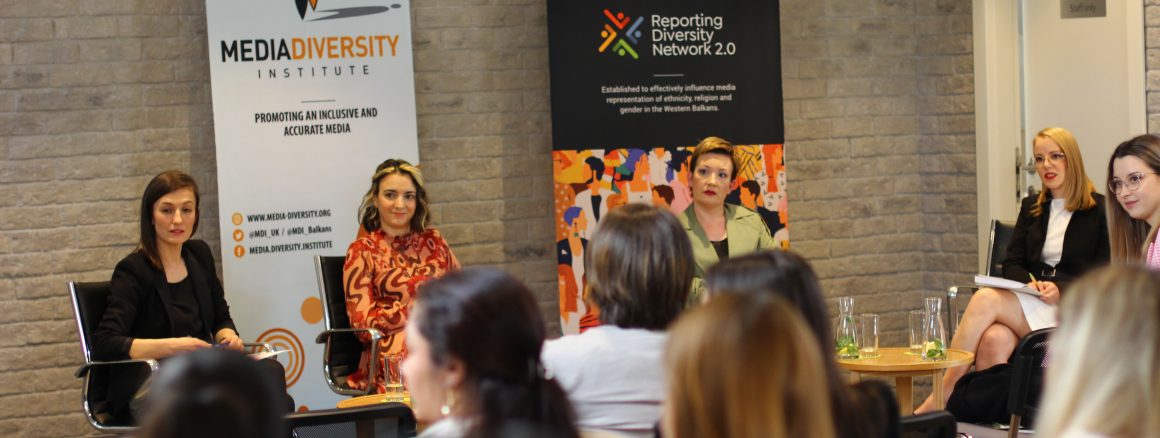Who asked her for her opinion – women in the media in Serbia
April 20, 2022
Although they make up half of the population, women as subjects and sources of news are in only a quarter of the world’s media content, according to the latest results of the Global Media Monitoring Project. The situation in Serbian media is below the world average, because women appear as interlocutors in a fifth of the content. Serbia has been participating in this research since 1995, and current results show no major progress since then.
Whether the statistics reflect the situation on the ground, how are women reflected in the media, in which areas we witness positive progress and what are the solutions for improving the image of women in the media in Serbia, was discussed on Thursday, April 14th, in Belgrade at the conference ‘Who asked her for her opinion – women in the media in Serbia’.
The changes do exist, but that they are very slow, concluded Ivana Jovanović (Media Diversity Institute Western Balkans), Danka Ninković-Slavnić, (Fakultet političkih nauka/Faculty of Political Science, University of Belgrade) i Ivana Kahrmann, consultant for media development and civil society, who shared their experiences at the first panel. The speakers agreed that women are mostly interlocutors on the topics of everyday experiences, they rarely speak form an expert position, they are more visible in the field of culture, entertainment, fashion, health, rather than, for example, politics, economic and security.
The feminisation of the profession has led to more female journalists working in the media than male journalists, but, paradoxically, they are not found in large numbers within editorial and decision-making positions, except at the local level.
Where there is less money, there are more women, because men leave those positions – Ivana Kahrmann explained this phenomenon and presented data from Association Local Press research on the position of the media in the local context. Of the 56 media workers from 28 cities in Serbia, 21 are media owners or directors, and some of them are also editors, not because they necessarily want to be, but because they do not have enough resources. They usually establish their own media, because they will not tolerate pressure or mobbing. The research of Local Press also showed that the most endangered category of all media workers and journalists are female journalists, who face the greatest pressure – from not being invited to events, through both verbal acts and violence in the digital space, as well as sexism.
On the other hand, when it comes to media content, of all the discriminatory topics, misogyny and sexism are the most common, and this is common across all countries in the region, according to the results of media monitoring conducted by the conference organiser – Media Diversity Institute Western Balkans – revealed. All the countries in the region are rooted in deep patriarchy, and that is reflected in the media, adds Ivana Jovanović, who conducts media monitoring in Serbia within the Reporting Diversity Network 2.0.

The media do not approach the topic of violence against women as a social problem, but stick to sensationalist reporting – said Jovanović and added that reporting on femicide is deeply problematic, because within the content on this topic you can read everything from secondary victimisation to conspiracy theories.
On a more positive note, the analysis of the group of Journalists Against Violence Against Women (Novinarke protiv nasilja prema ženama) showed that reporting on violence against women is better than it used to be.
In the past three years, 36,000 media publications have been reviewed, and according to all indicators, reporting on violence against women has improved, but the problem is still big – said Jovana Gligorijević (Journalists Against Violence Against Women) and added that she has hope for the young generation because they are young and more willing to be sensitive, as they are living in that which the older generation report on.
Minja Bogavac, agreed with her when presenting an example of good practice – the youth portal ZOOMER.
At the conference Who asked her for her opinion – women in the media in Serbia, the author of the series Ona se budi (She Wakes Up), Mia Bjelogrlić, also spoke about how the idea behind the series was to position the topic of gender equality within the mainstream arena.
– It is now the turn for women to tell the story form their point of view, how they see their position in society, and not for men to talk about it instead of them – said Bjelogrlić and added that there is no single answer to the question of how to unravel the patriarchy, but that she sees the solution to be one of a parallel process, both in the institutional and in the private sphere.
– There is an implied consensus in society as to how a women should live and behave, and changing that requires additional engagement, regardless of laws and quotas, because if the institutional framework does not reflect on everyday life, then there is a gap in which we live – explained the author of the series Ona se budi (She Wakes Up) and added that that is why proactive activism of various kinds is important.
One such solution is the Feminist Media Declaration presented by Jovana Netković (Feministički kulturni centar Befem/Feminist Cultural Center Befem). This document is the result of the continuous work of media experts and is another tool in the fight towards more gender-sensitive media reporting.
In addition, Befem created the Equality Bureau (biro jednakosti), where 19 lists are available to the media wither over 385 women experts in various fields and which integrated the gender perspective in the fields of education, security, sports, culture, economy, mental health etc.
The participants in the gathering agreed that the media is a powerful tool for socialisation, and that is why it is of importance how various identities are presented through them and how topics are discussed. As potential solution to changing the media image, the speakers also mentioned the tools created by the group Journalists Against Violence Against Women. Namely, there is a database of photographs and illustrations that responsibly and ethnically depict the problem of violence, forms and reactions to violence, and /or are aimed at strengthening and showing solidarity with those exposed to violence.
Media Diversity Institute, in addition to monitoring and analysing media content, offers as a solution to this issue – the creation of alternative and counter-narratives in order to contribute to the diversity of images of women in the media.
All speakers at the conference agreed that examples of good practice should always be highlighted, especially supporting female journalists who bring stories in a professional and sensible way, and recommended that colleagues and media workers always consult with those with whom the report refers to as to how they wish to be represented.
The Minister for Human and Minority Rights and Social Dialogue, Gordana Čomić, Deputy Commissioner for the Protection of Equality, Tatjana Prijić, Special Advisor to the Deputy Prime Minister and Minister of Culture and Information, Gordana Predić and representative of the Press Council, Jelka Jovanović, spoke about the protection mechanisms and the institutional framework for improving the image of women in the media, as well as the position of workers in the media.

Gordana Čomić stated that all acquired rights must be defended, and explained that the introduction of obligatory quotas for women in decision-making positions is reformative work that cuts into all layers of society.
This is a beginning that must be defended, because first you have to fight for your rights to be written down, then to be turned into action, and then you have to fight so that someone doesn’t bring you back, and only then to improve those papers – said Čomić, adding that you cannot ban prejudice, but you can ban behaviour based on prejudice.
Tatjana Prijić confirmed that stereotypes and prejudices are a big problem and added that one of the solutions to this is to start by not doing to others what we do not want to be done to us, and not just because the commissioner or the law will tell us not to.
The gathering was concluded with the words of Jelka Jovanović who said that the media is a mirror of society, but often also a generator of ideas or initiators of topics, and that only a small number of media raise the issue of the position of women, and therefore, men in society.
